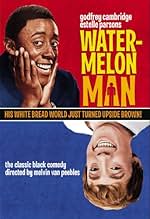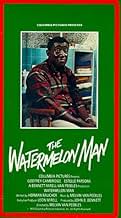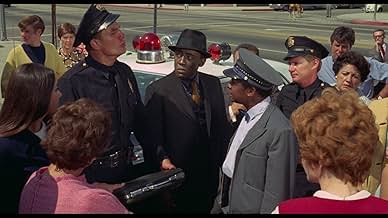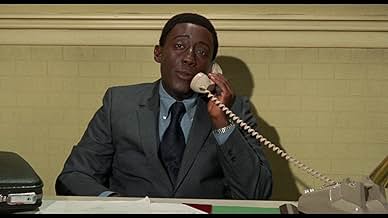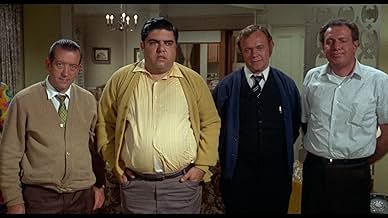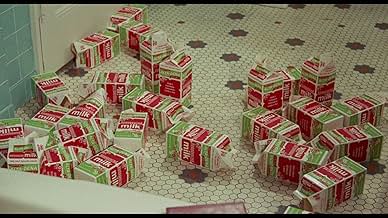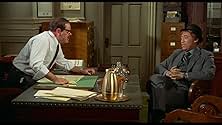IMDb RATING
6.7/10
3.1K
YOUR RATING
Jeff Gerber, a racist white man, wakes up one morning to discover that he has become black.Jeff Gerber, a racist white man, wakes up one morning to discover that he has become black.Jeff Gerber, a racist white man, wakes up one morning to discover that he has become black.
- Nominated for 1 BAFTA Award
- 1 win & 1 nomination total
Paul Williams
- Employment Office Clerk
- (as Paul H. Williams)
- Director
- Writer
- All cast & crew
- Production, box office & more at IMDbPro
Featured reviews
First - WHO's Godfrey Cambridge?!?! Yeah - he was a comedian. And a VERY funny one. Sigh.
OK, now that I've said that, let me make a couple of things understood. A lot of people who've written comments about this are either too young to remember the 60's/70's or are trying to relate to this film from today's perspective.
This film was written/directed by Melvin Van Peebles, who - at the time - was (and, by some - unfortunately) considered a 'controversial (black) artist. Second; yes, the makeup is not as good as the wonderful job done on Eddie Murphy in various films/skits, or the Wayans' brothers, but - for the make-up tech of the day - it was VERY good (look at the scene in the beginning when Godfrey's exercising (naked!), and then going to the shower. I just watched it on HD, and it still holds up VERY well (and as an aside; I saw this film first when I was about 10 - on TV. I thought upon seeing it that REALLY was a white man who became black. So, just remember that while you might not think his make-up's up to snuff now, it sure did convince an earlier generation).
Understanding when this film was made, the 'situation' of race relations at the time, and the ability for a (black) artist like Mr. Van Peebles to MAKE this film is necessary in understanding how shocking this film was - in all those areas.
Yes - the film's a bit dated (but who isn't?). But watching this film - and understanding what I've just explained makes it all the more extraordinary. Alex P (miskatonic86), and Definitedoll (just to name a couple) are some of the few who understand this film's importance.
Mr. Cambridge is/was one of the best comics. His 'babbling' - or more accuratley, his riffing on a subject was part of his stand-up style (if you'd like to see Godfrey not as a 'babbling' person, but as a (slightly ominous - and funny) character, check him out in THE PRESIDENT'S ANALYST, or in COTTON COMES TO HARLEM. , amongst other appearances.
He's sorely missed, by me and many others who've seen him either on such shows as ED SULLIVAN, THE MERV GRIFFIN SHOW CAR 54 WHERE ARE YOU, THE DICK VAN DYKE SHOW, I SPY amongst MANY other shows. If not, you can see this huge talent's work on YouTube (YouTube's a GREAT resource for educating yourself about not current performers and artists. It's NOT just a place to look at ...cat's playing pianos, and other garbage).
As a glimpse (by a black artist!) into the 'white man's world,' and the world in general - at that time - Mr. Van Peebles should be given his deserved recognition (and Godfrey, we miss you!).
OK, now that I've said that, let me make a couple of things understood. A lot of people who've written comments about this are either too young to remember the 60's/70's or are trying to relate to this film from today's perspective.
This film was written/directed by Melvin Van Peebles, who - at the time - was (and, by some - unfortunately) considered a 'controversial (black) artist. Second; yes, the makeup is not as good as the wonderful job done on Eddie Murphy in various films/skits, or the Wayans' brothers, but - for the make-up tech of the day - it was VERY good (look at the scene in the beginning when Godfrey's exercising (naked!), and then going to the shower. I just watched it on HD, and it still holds up VERY well (and as an aside; I saw this film first when I was about 10 - on TV. I thought upon seeing it that REALLY was a white man who became black. So, just remember that while you might not think his make-up's up to snuff now, it sure did convince an earlier generation).
Understanding when this film was made, the 'situation' of race relations at the time, and the ability for a (black) artist like Mr. Van Peebles to MAKE this film is necessary in understanding how shocking this film was - in all those areas.
Yes - the film's a bit dated (but who isn't?). But watching this film - and understanding what I've just explained makes it all the more extraordinary. Alex P (miskatonic86), and Definitedoll (just to name a couple) are some of the few who understand this film's importance.
Mr. Cambridge is/was one of the best comics. His 'babbling' - or more accuratley, his riffing on a subject was part of his stand-up style (if you'd like to see Godfrey not as a 'babbling' person, but as a (slightly ominous - and funny) character, check him out in THE PRESIDENT'S ANALYST, or in COTTON COMES TO HARLEM. , amongst other appearances.
He's sorely missed, by me and many others who've seen him either on such shows as ED SULLIVAN, THE MERV GRIFFIN SHOW CAR 54 WHERE ARE YOU, THE DICK VAN DYKE SHOW, I SPY amongst MANY other shows. If not, you can see this huge talent's work on YouTube (YouTube's a GREAT resource for educating yourself about not current performers and artists. It's NOT just a place to look at ...cat's playing pianos, and other garbage).
As a glimpse (by a black artist!) into the 'white man's world,' and the world in general - at that time - Mr. Van Peebles should be given his deserved recognition (and Godfrey, we miss you!).
I first saw this film on television about 7-8 years ago. It was part of a "Heritage Network" movie special. This was hosted by Ruby Dee and Ossie Davis. I fell in love!!! I had to own this film!!! How much were they holding the film hostage for???? $20 dollars??? $100 dollars?? And so I waited for a few years. My father would keep saying to me "Aren't you going to buy that movie?" I'd say "Yeah Soon", but just didn't want to cough up the cash for it. Then it finally arrived on DVD in 2004 or so. I purchased it at Media Play. And I have watched it several times. I think that it's ahead of its time. Godfrey Cambridge plays a very disciplined white man with a nice white family. He puts on his sneakers and runs down the hill as exercise racing with the bus. Just the like the Yuppies of the 80's that wore sneakers to work then changed shoes. He was doing this in 1969.. He was an insurance man and he believed in exercise, family, all the values that this country was raging against in 1969. Then he wakes up one day and is black. All the showers in the world can't wash off the color. His whole universe changes. Some for the worse, some for the better. I have a whole new respect for Godfrey Cambridge from this film. A highly intelligent man in real life, Godfrey lets this shine through in this film. Especially poignant is when he is selling insurance to young black families. He talks straight to them, and doesn't patronize them. You will see this in the film. No hard sell, No baloney. Another tidbit that you will find interesting is that the house interior they used is the same one that they used for another famous television family.....THE PARTRIDGE FAMILY!!!!!! There is a small barely audible directors commentary with the film, and you have to listen carefully to really understand it. Seems that the film company did not treat Mr. Van Peebles very nicely. And I am putting this nicely as i can. Anyway it's a gem of a movie!!!!
Cambridge does an interesting lob playing a white man turned into a black man, but Van Peebles evidently wanted to make some pejorative assessments of both cultures. The negativity of the film is offset by slapstick and schtik - like the moment of awareness of the transition when Gerber goes to the bathroom in the middle of the night and when he gets off the toilet, a big black rear end fills the screen. The transition, itself, is never adequately explained: recessive gene gone berserk, sardonic God teaching a lesson, who knows?
The sad part of the film is the inability to ever find purchase in the community. Not everyone is bigoted but they are all portrayed as one big cliché. Any normal unbiased people are immediately put off by the reprehensible actions of Cambridge - so there are no friends or allies except of the same race - or more purely - of the same anger.
How nice this movie could have been if Van Peebles had allowed Gerber to rise to the top in spite of everything - to showcase hope instead of futility.
The sad part of the film is the inability to ever find purchase in the community. Not everyone is bigoted but they are all portrayed as one big cliché. Any normal unbiased people are immediately put off by the reprehensible actions of Cambridge - so there are no friends or allies except of the same race - or more purely - of the same anger.
How nice this movie could have been if Van Peebles had allowed Gerber to rise to the top in spite of everything - to showcase hope instead of futility.
In Watermelon Man, director Melvin Van Peebles expresses complex ideas about race and racism in a sophisticated but humorous way. At that, however, if you do not have a strong taste for grotesques--in a formal sense ("outlandish or bizarre; ludicrous or incongruous distortion")--you may not enjoy the film as much as I did. It is something of a surreal, occasionally psychedelic caricature, but as such, it does what all good caricature should do--it emphasizes the truth without being strict realism or "naturalism".
Watermelon Man is the story of Jeff Gerber (Godfrey Cambridge). He's something of a strange dweeb who nevertheless has a stereotypical white-bread suburban existence. He's got a wife, two preadolescent kids, a nice home with a manicured lawn, and so on. He's also something of a health nut (although humorously, Cambridge wasn't exactly in great shape when they shot the film). As the film opens, he's busy exercising while his wife is trying to capture a few more minutes of sleep. He regularly uses a sun lamp. He takes the bus to his insurance salesman job, but instead of catching it right down the street, he races it through the neighborhood every day, the goal being to beat it to the last stop before it gets on the highway.
Jeff presents himself as happy-go-lucky and quite a joker, but he's a bit obnoxious and boorish, plus he shows himself to be racist and a male chauvinist, although he's not exactly gung ho about sleeping with his wife.
Just as we're learning about Jeff's routine, something unusual happens--he wakes up in the middle of the night as a black man. At first he thinks it's a nightmare, but it doesn't go away. He blames it on the sun lamp. He blames it on food he's ingesting. The bulk of Watermelon Man has Jeff trying to at first conquer, then later deal with his newfound "problem".
If you've seen both films, you might find it odd that Van Peebles made Watermelon Man before Sweet Sweetback's Baadasssss Song (1971). Unlike Sweet Sweetback, which is intriguing in its own way, but not near as good of a film artistically and technically, the direction in Watermelon Man is finely nuanced and sophisticated, the cinematography is crisp and attractive and technical elements such as sound are superb. I suppose this might be an interesting lesson in how crucial budget and "legitimacy" can be for film-making. It gives access to the finest materials and resources, including a large stable of professionals with narrow specialties. At that, however, Watermelon Man is not nearly as respected now as Sweet Sweetback because of what Sweet Sweetback represents, both ideologically and influentially in the film industry. Sweet Sweetback was something of a revolutionary (and very psychedelic) cry for African-American rights, and it helped launch not only the blaxploitation craze of the 1970s, but also fiercely independent film-making.
Yet, Watermelon Man is just as unique and important in what it has to say about race, even if it's not violent or pornographic, and not bizarre in the same way. Once Jeff becomes black, everything about his life changes. There isn't a person around who doesn't relate to him differently, with many having a polar opposite reaction to him--both his white friends (and family, of course) and his black acquaintances (they weren't friends, exactly, when Jeff thought he was white). Everyone wants to exploit his newfound state, including his boss. Van Peebles makes a sly transition from the beginning to the end of the film that goes from white-bread sitcom to something of a militant blaxploitation flick in a way that you barely even notice.
A large part of what makes Watermelon Man so odd is Godfrey Cambridge. His performance is way over the top and consistently bizarre, but for some of us, in some contexts (such as for me in this context), this kind of bizarre, over the top material works extremely well--in fact, I tend to prefer this to realism. The other performances are at least interesting, even if they're not all good in a conventional wisdom evaluation, but Cambridge really carries the film.
Equally bizarre and a bit disturbing is Cambridge's make-up as a white man. The make-up is extremely well done--it's difficult to picture Cambridge as he really looks underneath it all, but given the character's disposition, Cambridge as a white man comes off as freakish to say the least.
Van Peebles' direction is extremely admirable. He's not afraid to take all kinds of thrilling chances, including such unusual moves as quick pans to go from character to character in a conversation and odd intrusions of psychedelia, such as the scene that suddenly starts flashing different negative exposure images, or the scene that stops to insert commentary that resembles silent film intertitles.
Van Peebles also did the music here, as he did in Sweet Sweetback, and it's just as weird. Near the end of the film, there's an extended version of a song that rips-off "Heard It Through The Grapevine" that features a vocal that even The Residents would raise an eyebrow to. Again, I love weird stuff, so I was happier than a pig in, um, mud.
If there's anything less than satisfactory about Watermelon Man, it's that it engenders sadness that Van Peebles wasn't able to talk the helm more often. He made a controversial move in this film by changing the ending in the original script, as he rightfully should have done (Columbia originally wanted an "it was all a dream" ending, which would have been ridiculous and insulting, to say the least), and that, combined with his independent production of Sweet Sweetback the following year, didn't exactly put him on Hollywood's successful brownnoser list.
Watermelon Man is the story of Jeff Gerber (Godfrey Cambridge). He's something of a strange dweeb who nevertheless has a stereotypical white-bread suburban existence. He's got a wife, two preadolescent kids, a nice home with a manicured lawn, and so on. He's also something of a health nut (although humorously, Cambridge wasn't exactly in great shape when they shot the film). As the film opens, he's busy exercising while his wife is trying to capture a few more minutes of sleep. He regularly uses a sun lamp. He takes the bus to his insurance salesman job, but instead of catching it right down the street, he races it through the neighborhood every day, the goal being to beat it to the last stop before it gets on the highway.
Jeff presents himself as happy-go-lucky and quite a joker, but he's a bit obnoxious and boorish, plus he shows himself to be racist and a male chauvinist, although he's not exactly gung ho about sleeping with his wife.
Just as we're learning about Jeff's routine, something unusual happens--he wakes up in the middle of the night as a black man. At first he thinks it's a nightmare, but it doesn't go away. He blames it on the sun lamp. He blames it on food he's ingesting. The bulk of Watermelon Man has Jeff trying to at first conquer, then later deal with his newfound "problem".
If you've seen both films, you might find it odd that Van Peebles made Watermelon Man before Sweet Sweetback's Baadasssss Song (1971). Unlike Sweet Sweetback, which is intriguing in its own way, but not near as good of a film artistically and technically, the direction in Watermelon Man is finely nuanced and sophisticated, the cinematography is crisp and attractive and technical elements such as sound are superb. I suppose this might be an interesting lesson in how crucial budget and "legitimacy" can be for film-making. It gives access to the finest materials and resources, including a large stable of professionals with narrow specialties. At that, however, Watermelon Man is not nearly as respected now as Sweet Sweetback because of what Sweet Sweetback represents, both ideologically and influentially in the film industry. Sweet Sweetback was something of a revolutionary (and very psychedelic) cry for African-American rights, and it helped launch not only the blaxploitation craze of the 1970s, but also fiercely independent film-making.
Yet, Watermelon Man is just as unique and important in what it has to say about race, even if it's not violent or pornographic, and not bizarre in the same way. Once Jeff becomes black, everything about his life changes. There isn't a person around who doesn't relate to him differently, with many having a polar opposite reaction to him--both his white friends (and family, of course) and his black acquaintances (they weren't friends, exactly, when Jeff thought he was white). Everyone wants to exploit his newfound state, including his boss. Van Peebles makes a sly transition from the beginning to the end of the film that goes from white-bread sitcom to something of a militant blaxploitation flick in a way that you barely even notice.
A large part of what makes Watermelon Man so odd is Godfrey Cambridge. His performance is way over the top and consistently bizarre, but for some of us, in some contexts (such as for me in this context), this kind of bizarre, over the top material works extremely well--in fact, I tend to prefer this to realism. The other performances are at least interesting, even if they're not all good in a conventional wisdom evaluation, but Cambridge really carries the film.
Equally bizarre and a bit disturbing is Cambridge's make-up as a white man. The make-up is extremely well done--it's difficult to picture Cambridge as he really looks underneath it all, but given the character's disposition, Cambridge as a white man comes off as freakish to say the least.
Van Peebles' direction is extremely admirable. He's not afraid to take all kinds of thrilling chances, including such unusual moves as quick pans to go from character to character in a conversation and odd intrusions of psychedelia, such as the scene that suddenly starts flashing different negative exposure images, or the scene that stops to insert commentary that resembles silent film intertitles.
Van Peebles also did the music here, as he did in Sweet Sweetback, and it's just as weird. Near the end of the film, there's an extended version of a song that rips-off "Heard It Through The Grapevine" that features a vocal that even The Residents would raise an eyebrow to. Again, I love weird stuff, so I was happier than a pig in, um, mud.
If there's anything less than satisfactory about Watermelon Man, it's that it engenders sadness that Van Peebles wasn't able to talk the helm more often. He made a controversial move in this film by changing the ending in the original script, as he rightfully should have done (Columbia originally wanted an "it was all a dream" ending, which would have been ridiculous and insulting, to say the least), and that, combined with his independent production of Sweet Sweetback the following year, didn't exactly put him on Hollywood's successful brownnoser list.
I'd only seen "Watermelon Man" on late nite TV as a kid, obviously cut to hell, but the film always fascinated and disturbed me. I haven't seen it in literally 20 years yet I remember very specific scenes, particularly the amazing militant final scene. I finally picked up the beautiful DVD and my memory was correct. The movie is awkward in spots, but there's a vitality that pushes against the old-school studio vibe. And it still holds up as funny in many scenes. I like some of Peebles music cues although they are sometimes not apropos. There are some strong scenes dealing with suburban racial tensions and Godfrey Cambridge is terrific as he changes from a white bigot to a black man. The movie isn't as one-sided as some might think. One of my favorite films of the 70's. Check it out.
Did you know
- TriviaMelvin Van Peebles: The artist who letters Jeff Gerber's new office door.
- GoofsDr. Wainwright asks Jeff if he knows that the first man to die in an American war was Crispus Atticus. The man's name was actually Crispus Attucks, NOT Atticus. The doctor puts in an extra syllable.
- Quotes
Delivery Man: That guy needs a sun lamp like Fred Astaire needs dancing lessons.
- ConnectionsFeatured in The Real Deal: What It is (2003)
- SoundtracksLove, That's America
Written and performed by Melvin Van Peebles
- How long is Watermelon Man?Powered by Alexa
Details
- Release date
- Country of origin
- Language
- Also known as
- The Night the Sun Came Out
- Filming locations
- Burbank, California, USA(Studio)
- Production companies
- See more company credits at IMDbPro
Box office
- Budget
- $1,000,000 (estimated)
- Runtime1 hour 40 minutes
- Sound mix
- Aspect ratio
- 1.85 : 1
Contribute to this page
Suggest an edit or add missing content



